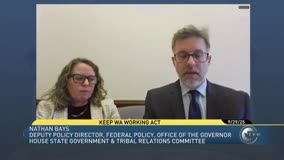Washington District Court Rules Against DHS Grant Conditions for Immigration Enforcement
September 29, 2025 | Legislative Sessions, Washington
This article was created by AI summarizing key points discussed. AI makes mistakes, so for full details and context, please refer to the video of the full meeting. Please report any errors so we can fix them. Report an error »

In a pivotal meeting held on September 29, 2025, the Washington House State Government & Tribal Relations Committee delved into pressing issues surrounding immigration policy and state-federal relations. The atmosphere was charged with anticipation as representatives gathered to discuss the implications of a recent district court ruling that favored the state against the Department of Homeland Security (DHS).
The court's decision, which granted a permanent injunction against DHS, deemed the agency's conditions for emergency assistance grants as coercive and unconstitutional. This ruling highlighted the state's ongoing struggle to maintain its autonomy in the face of federal immigration enforcement pressures. The court criticized DHS for failing to consider public safety in its funding conditions, a point that resonated deeply with the committee members.
As the discussion unfolded, Governor's office representatives emphasized proactive measures taken to address these challenges. They noted updates to agency training on data privacy and the Keep Washington Working Act, aimed at ensuring that state resources are not misused for federal immigration enforcement. The Governor's commitment to fostering open communication with community advocates was also underscored, with regular meetings designed to address concerns and enhance collaboration.
However, the dialogue took a more technical turn when Representative Walsh raised questions about the distinctions between legal and illegal immigration within the context of the Keep Washington Working Act. He sought clarity on how these distinctions might influence potential conflicts between state and federal laws. The representatives from the Governor's office maintained that the state law is compliant with federal regulations, asserting that the Keep Washington Working Act protects all residents of Washington, regardless of their immigration status.
The committee's discussions reflect a broader narrative of states grappling with federal immigration policies and the quest for a balance between compliance and advocacy for community rights. As Washington navigates these complex legal waters, the implications of the court's ruling and the ongoing dialogue with community leaders will likely shape the state's approach to immigration enforcement in the future. The meeting concluded with a sense of urgency and determination, as representatives prepared to tackle the challenges ahead while ensuring the rights and safety of all Washingtonians remain a priority.
The court's decision, which granted a permanent injunction against DHS, deemed the agency's conditions for emergency assistance grants as coercive and unconstitutional. This ruling highlighted the state's ongoing struggle to maintain its autonomy in the face of federal immigration enforcement pressures. The court criticized DHS for failing to consider public safety in its funding conditions, a point that resonated deeply with the committee members.
As the discussion unfolded, Governor's office representatives emphasized proactive measures taken to address these challenges. They noted updates to agency training on data privacy and the Keep Washington Working Act, aimed at ensuring that state resources are not misused for federal immigration enforcement. The Governor's commitment to fostering open communication with community advocates was also underscored, with regular meetings designed to address concerns and enhance collaboration.
However, the dialogue took a more technical turn when Representative Walsh raised questions about the distinctions between legal and illegal immigration within the context of the Keep Washington Working Act. He sought clarity on how these distinctions might influence potential conflicts between state and federal laws. The representatives from the Governor's office maintained that the state law is compliant with federal regulations, asserting that the Keep Washington Working Act protects all residents of Washington, regardless of their immigration status.
The committee's discussions reflect a broader narrative of states grappling with federal immigration policies and the quest for a balance between compliance and advocacy for community rights. As Washington navigates these complex legal waters, the implications of the court's ruling and the ongoing dialogue with community leaders will likely shape the state's approach to immigration enforcement in the future. The meeting concluded with a sense of urgency and determination, as representatives prepared to tackle the challenges ahead while ensuring the rights and safety of all Washingtonians remain a priority.
View full meeting
This article is based on a recent meeting—watch the full video and explore the complete transcript for deeper insights into the discussion.
View full meeting
